A JEW AND A CHRISTIANHOW TOGETHER THEY CHANGED HISTORY
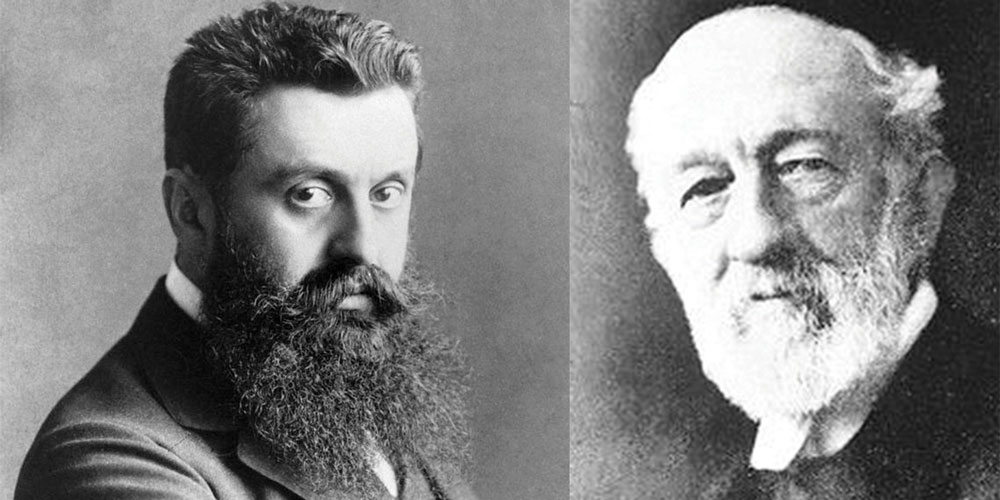
Left: Theodore Herzl, of whom Israel’s Declaration of Independence officially refers to as the spiritual father of the Jewish State. Right: William Hechler, friend, mentor and legitimizer of Herzl’s vision and calling. He is considered the father of Christian Zionism.
There is not an Israeli school child anywhere in the world who has not heard of Theodore Herzl—the Father of Modern Israel. But few people—in or out of Israel—have ever heard of William Hechler.
Yet many historians concede if it weren’t for Pastor Hechler, Herzl would probably never have been anything more than an obscure, eccentric, minor Austrian newspaper columnist. This is a story about Theodore Herzl, William Hechler… and yes, divine intervention.
Hechler’s father, an Anglican priest, had a deep admiration and respect for the Jewish people. This love for God’s chosen people profoundly influenced his son. In fact, it consumed him.
Since the Protestant Reformation starting in the early sixteenth century—there had been pockets of Christian lovers of Zion throughout Europe and the United States. This was in spite of the fact the Reformation’s pioneer, Martin Luther, hated the Jewish people.
EARLY CHRISTIAN ZIONISTS
The second U.S. president, John Adams, of Puritan background, wrote with clarity and understanding in 1819, “I sincerely wish to see the Jews settled in Judah, forming an independent nation.”
Protestant Biblical Zionism spread widely across the European continent, as seen in the letter British Lord Shaftesbury sent to Queen Victoria, pleading, “May it be during your reign that, according to the hopes of this unique people now laid before Your Majesty, ‘Judah shall be saved and Israel shall dwell in peace.’ Such is the prayer of the loyal and devoted servant of your Majesty.”
However, promoting the practical return of the Jews to their ancient homeland was for those few brave Christians who dug deeply and regularly into the Word of God. Rev. William Hechler was one of those.
For fifty years, Hechler traversed his world. As an Anglican cleric with both English and German as his mother tongue, he worked in Nigeria, served in the German army, raised a family in Cork, Ireland and became proficient in ten languages. Then in 1873, as often happens, strategic changes took place in his life, though only many years later would he understand their importance.
A TUTOR TO ROYALTY
He moved to Karlsruhe, Germany where he served as household tutor to the children of Frederick I, Grand Duke of Baden, whose wife was a close relative of the powerful German Kaiser, Wilhelm II. This new position became by far the most significant of all his varied vocations and was the turning point of his life.
During the years he served the Grand Duke, he took many opportunities to share with him the Scriptures, together with his charts and papers on the days of the Coming Messiah, which would be heralded by the Jews returning to their homeland.
The Grand Duke became a very strong believer and ally of Hechler concerning God’s promises to the Jewish people. But six years later the Grand Duke’s son died and Hechler’s tutoring position ended. He then returned to London as an official minister of the Church of England.
Providentially he was chosen by the Church Pastoral Aid Society—Zionist Christians—to travel to Germany, France and Russia to investigate the terrible pogroms occurring in the 1880’s. He was shocked to his core at the appalling suffering and wretchedness of Russian Jews under Czar Alexander III. It was far worse than anything he had imagined.
FIRST SIGNS OF JEWISH ZIONISM
But Hechler saw something else, something new. He saw emerging Zionist hopes in the Eastern Jewry because of the abject poverty, persecution and hopelessness they were enduring in Russia.
He, a humble Anglican cleric, felt so desperate for Russian Jewry that he dared to dream of reaching the Sultan of Turkey, Abdul Hamid II—the latest occupier of the Holy Land and regent of the Ottoman Empire—in order to ask him to allow Jews to settle in Palestine.
That takes grit. But he did actually have in his possession—which he attempted to deliver through the British Ambassador—a letter written by none other than Queen Victoria of England to the Sultan. Incredibly, the Queen had written a “restorationist solution” to anti-Semitism, and called upon the Sultan to permit the Jews to return to Palestine. But the British Ambassador refused to present the Queen’s letter to the Sultan! Hechler had no recourse.
Meanwhile, Hechler’s greatest personal desire was to move to Jerusalem by securing an appointment as the Bishop of Jerusalem at the famous Protestant Christ Church. But it was not to be. Deteriorating relations between Prussia and England blocked his appointment. Some officials were rumored to have said he was too Zionist. It was a crushing disappointment.
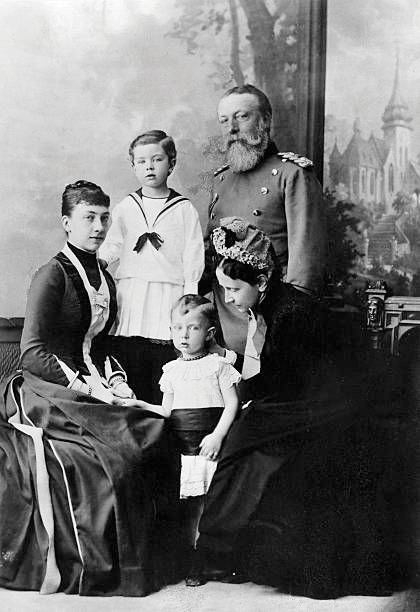
Frederick I, Grand Duke of Baden, together with his wife, a close relative of the German Kaiser, Wilhelm II, and his children whom Hechler tutored.
CHAPLAIN OF BRITISH EMBASSY IN VIENNA
This bitter blow, and corresponding spousal strains, led to his marriage failing that same year. But through a caring aunt, he secured an appointment as the Chaplain of the British Embassy in Vienna—another “divine appointment” which would ultimately change Jewish history. Hechler began a twenty-five-year career as Embassy Chaplain, and became known as the Viennese pastor.
He likely fretted under constraints as chaplain, alone with his Bible and Messianic charts, and his one luxury—books. Nevertheless he had opportunity as a Viennese University lecturer to expound on his passion—the Jews and their soon-to-be homeland—and took every opportunity to speak on the subject to officials, rulers and statesmen who came through the embassy.
In fact, he had just finished writing his own treatise the year before he took his new job. It was titled, “The Restoration of the Jews to Palestine in Prophecy.”
This was no quickly-written manuscript. For years, his greatest pleasure was to study and search—and preach—what the Scriptures say about the promised return. He was convinced this would usher in the Messianic Age and the return of the Messiah. He declared, “It is the duty of every Christian to love the Jews.”
FIRST, JEWS MUST RETURN HOME
Yes, he believed the day would come when the Jewish people would accept God’s Messiah, but he was convinced that they first had to return home.
Therefore, he also studied every inch of the physical land of Israel. He collected military maps of Palestine, created charts of ancient locations, and pored over prophetic portions of Scripture as to when the Jews would return to their homeland.
His understanding of the “times of the Gentiles fulfilled” meant when Jerusalem would no longer be trampled by the Gentiles, but returned to the Jews.
Hechler was ready to give his life to this cause, but there was one major missing component. Where was the leader? Where was the “Moses” who would take the Jewish people out of Egypt and into the Promised Land? Hechler prayed three times a day every day for the return of the Jews to their homeland.
THE LEADER APPEARS
Then, on a Saturday morning, March 9, 1896, he was passing one of his favorite bookstores. In the window, he saw a new book, “The Jewish State,” by Theodore Herzl.
He quickly asked the storekeeper about the author. Being that he was not a man who visited the theater, he didn’t know Herzl, a well-known playwright, journalist and an altogether assimilated Viennese Jew.
What had awakened the soul of this secular Jew was a scandal that rocked France in the late nineteenth and early twentieth centuries—the Dreyfus affair. It involved a Jewish artillery captain in the French army, Alfred Dreyfus, who was falsely convicted on flimsy and fraudulent evidence of passing military secrets to the Germans. In short, a Jewish traitor. Anti-Semitism in France exploded. It was a full twelve years later before Dreyfus was exonerated.
JEWS MUST REESTABLISH THEIR STATE
Herzl’s book was clear: If France or any country did not want Jews, the Jewish solution was to return to their ancient homeland and reestablish a Jewish state.
Herzl’s insight was profound: He wrote, “Those [Jews] who are desperate will go first, after them the poor, next the prosperous, and last of all the wealthy.”
Hechler could hardly believe his eyes as he read, “I believe that a wonderful generation of Jews will spring into existence. The Maccabees will rise again. Let me repeat once more my opening words: the Jews who wish for a State will have it.”
Hechler rushed to the residence of Herzl.
Without even introducing himself, he declared, “Dr. Herzl, I have been waiting for you four years. Four years I have been announcing you to princes, statesmen, and ecclesiastical dignitaries whom I met. I have prepared the way for you. The hour has rung, and your idea will succeed. Consider me as being at your service, at the service of our cause!”
Herzl didn’t know what to make of this stranger.
Hechler continued, “Your book is inspired, Dr. Herzl, in a way you yourself do not realize, and that’s good. This is a sign of the very grace of God. For, just like everybody else, including every Jew in this capital, you have forgotten your prophets. You don’t give them credit any more. But you belong to your people and your prophets and this, combined with the suffering of Israel, will not let you rest.”
“Like Moses in the past,” he said, “It is your people’s martyrdom, both in Russia and in the features of a French captain [Dreyfus] which now brings you back to God and toward the forgotten Jerusalem. I tell you with emotion—and I will always repeat it: God is with you and you will succeed, come what may!”
Recording this meeting in his diary, Herzl wrote: “He is an improbable figure when looked at through the quizzical eyes of a Viennese Jewish journalist…to be sure, I think I detect from certain signs that he is a believer in the prophets.”
And so, the eight-year partnership of Herzl and Hechler began.
HERZL ASKS FOR HECHLER’S HELP
The following Sunday, March 15, 1896, Herzl paid his first visit to his new friend. Hechler’s walls were covered with books, Bibles, and various documents up to the ceiling. Hechler first showed him his panoramic chart extending from Adam to 1897! The year 1897 was in red ink. [See side bar on page 8.]
Herzl wrote in his diary: “Next, we came to the heart of the business. I said to him: I must put myself into direct and publicly known relations with a responsible…ruler—that is, with a minister-of-state or a prince. Then the Jews will believe in me and follow me.”
Here in a nutshell was Herzl’s greatest challenge and roadblock. It would be his main “trial by fire”—and there were many—until his death. The European Jews of wealth wanted nothing to do with Herzl or his Zionist dream.
These Jews, many of them not so long ago freed from European rulers’ laws and restraints against Jews, didn’t want to rock the boat, and, in fact, were quite complacent with their present circumstances.
But Hechler, understanding the Bible’s prophetic promises, was ready to spend his life helping Herzl—his Moses. Because of his many contacts with European princes, dukes and ambassadors of high standing, he immediately began to make way for Herzl to meet the two people they thought could most help the Jewish cause: the German Kaiser Wilhelm II and the Turkish Sultan Abdul Hamid II.
HECHLER’S THEOLOGY
Hechler’s theology went something like this: The Synagogue has not been called upon to blend in with the nations, and the Church cannot cause it to disappear. God does not want the children of Israel to lose their “Jewishness” by merging with a Christian mass, remote from the Synagogue where the Church was born.
God wants His people to come back to Him through a return to the Scriptures and indeed, that they realize (if possible while remaining in the Synagogue) that this Messiah who is coming in glory has already come in suffering and death.
In a letter of October 5, 1896, he wrote, “Only on the earth of Israel will the Jewish people again find God and His prophets, as well as deep nostalgia for the Messiah.”
HERZL MEETS RULER OF HOLY LAND
Through the Grand Duke of Baden, Herzl met the Sultan of Turkey and attempted to gain a charter for the establishment of a Jewish state in Palestine, then ruled by the Ottoman Empire.
It seemed a very realistic possibility because of the critical debts of the Sultan—that if Herzl could raise enough funds, he would be able to buy the land of Palestine! But the Rothschilds and other Jews of wealth would have none of it! The meeting with the Sultan did not bear fruit.
Often, when Herzl would become discouraged, Hechler would encourage him with constant letters and visits:
“Let us calmly remember, especially at the most trying and darkest of times, that the will of God is accomplished in spite of the foolishness of men. This morning I came to see you in order to bring you a word of comfort. May God guide you in His Grace and grant you His wisdom. Be calm and put your trust in Him.”
Thus, ended 1896, the first year of their meeting—with nine full months of devoted friendship. In this short period, thanks to William Hechler, the Zionist leader’s name and movement had become known essentially through the audiences granted by Grand Duke Frederic I of Baden. Echoes had somehow reached all the royal courts of Europe and their representative governments. This gave hope to Herzl’s principal concern: to persuade his own people and especially the powerful and wealthy Jews among them, to follow and support him.
FIRST ZIONIST CONGRESS
The two men continued to meet more and more nobility, ambassadors, bishops and people of influence, many of whom had been influenced by Hechler.
And finally, Herzl convened the first ever Zionist Congress in 1897, which became the famous starting point of the dream of a Zionist state.
Hechler, who was invited by Herzl as a non-voting visitor, wrote to the Grand Duke:
“I hope next week to attend the Zionist Congress at Basel…It is simply marvelous how the Zionist movement has spread in one year all over the world, in spite of the opposition of some of the rich Jews, who care but very little for the glorious history of their ancestors…I am convinced that the establishment of a Jewish State, with the support of European princes, will initiate the salvation announced by Isaiah, Micah, and Zechariah…”
Thus, it was from August 29-31, 1897 an astonished world learned about the gathering together in Basel of “The Constituent Assembly of the Jewish Nation” represented by 208 delegates in full dress, in accordance with the explicit wish of Herzl. Twenty-six press correspondents also attended the event.
What thoughts must have been going through the minds of both Herzl and Hechler as they looked on this gathering of Jews planning a future state for their ancient homeland.
It was one of the far-too-few moments of ecstasy that Herzl would experience.
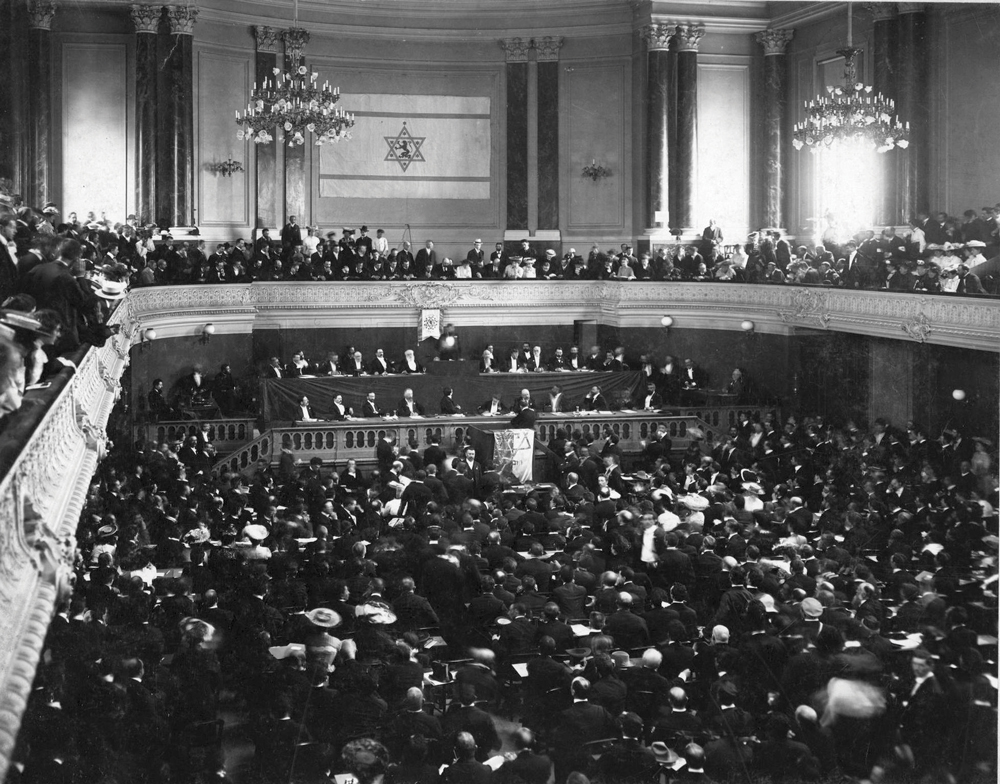
The first Zionist Congress was convened in 1897 by Theodore Herzl as a symbolic parliament for a tiny minority of Jews who believed the solution to European anti-Semitism was to establish a publicly and legally assured home in Palestine. The year 1897 is considered the beginning of the Zionist movement which ultimately established the State of Israel.
A TRUE PROPHECY
The leader of the Zionist movement, Theodore Herzl, spoke prophetically in August 1897 that a new State of Israel would rise again after 1900 years of desolation. In 1947, the United Nations, in one of its very few pro-Israel resolutions, voted the State of Israel into existence. Exactly 50 years later.
But the conference was only the start. For eight years, the two men battled the resistance to a Jewish State, coming from every corner. In Part II of this article (below) we will again join the path these two men walked to father a Zionist movement, and prepare the way for a reborn State of Israel.
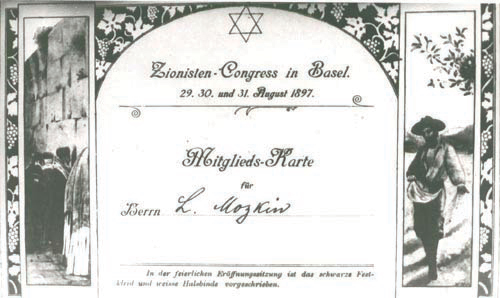
The Invitation Card for entry to the First Zionist Conference in Basel, Switzerland. Delegates invited were 208 Jews from 17 countries and 10 non-voting Christians including the most prominent of them, William Hechler.
HECHLER’S PROPHECY
William Hechler unceasingly studied the Scriptures about Israel and her future. Among his studies he pondered the book of Daniel, and compared it with the book of Revelation. Jerusalem would be delivered up to “Gentile” occupation for forty-two months, followed by a promised period of blessing.
THE BIBLICAL FORTY-TWO MONTHS
But how to interpret the forty-two months? Most scholars of that time agreed that one prophetic month was not thirty days but thirty years—which comes out to 1260 years. It is a number that appears both in Daniel and Revelation. So, the Temple was destroyed and taken from the Jews in 70 A.D. Add 1260 years and the year is 1330—a dead end as nothing happened in 1330.
But Daniel 12:11 also states that the 1,290 days [or years] will start after the abomination of desolation is set up in the holy place (where the Temple was). So what is this abomination?
In 627-628, Jerusalem fell into the hands of a pagan power: Islam, under its third Caliph—Omar, Mohammed’s brother-in-law. He not only took possession of Jerusalem; he razed the medieval Christian church built on the “Holy Place,” and built the Mosque of Omer to the glory of the prophet. Hechler surely knew that in this mosque there is written the Koranic verses including “God has no Son.”
If one adds 1260 years to the year 627-628, he comes to 1897-1898. Hechler was convinced that 1897-1898 would mark the dawn of the final restoration of Israel in the Promise Land!
No, he was not announcing either the End of the Age, or the Second Coming. But what he did announce was the starting point of the ultimate restoration of the people of Israel to the Land of Israel.
PART II : A JEW, A CHRISTIAN, AND THE EMPERORHOW A PICTURE AND PROVIDENCE CHANGED HISTORY
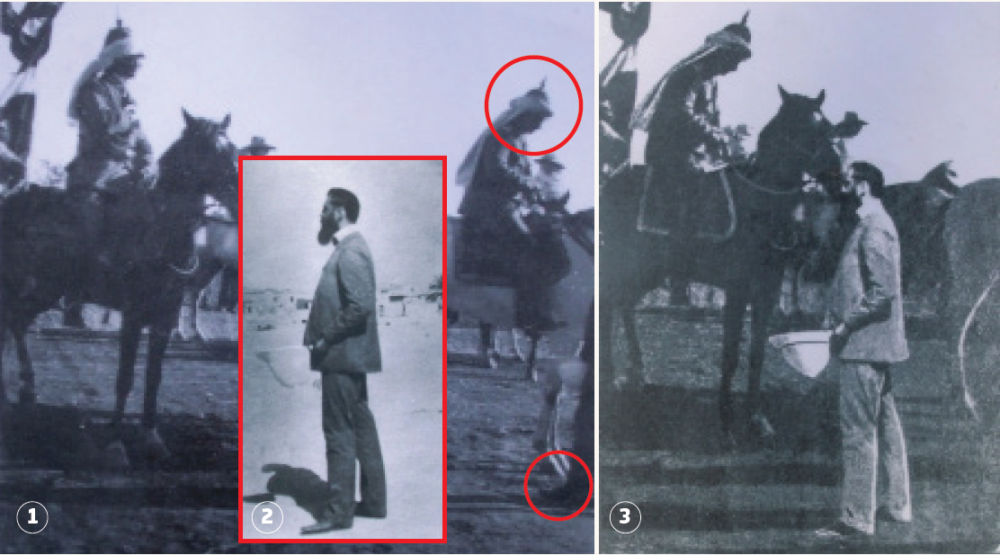
The picture that helped establish the State of Israel!
Picture 1: Theodore Herzl “happened” to meet the Kaiser—the Emperor of Germany—along the highway going to Jerusalem. The Kaiser saw Herzl whom he had privately met and stopped to greet him. Herzl’s photographer snapped a picture of this earth-shaking moment in Jewish history. But when Herzl saw the picture, he was aghast. The head of the white horse the Kaiser was riding was cut off, and only the leg and foot of Herzl could be seen. Somehow the photographer had missed the whole event! Though a good photographer he was not, he was a magnificent improviser.
Picture 2: He took another photo of Herzl on a plain white roof and photoshopped Herzl into the picture. But wait! He also needed a whole horse. Never mind. Yes! In 1898 he took the Kaiser off the white horse and put him on the black horse.
Picture 3: And Voila! A photo of what really happened in that chance—but critically significant—moment went around the world. Now read the whole story!
Theodore Herzl, today considered the Father of the Modern State of Israel, had just hosted the first Zionist Congress in Basel, Switzerland, with 202 delegates in 1897. The Zionist movement was birthed and began to breathe.
Herzl exulted in his diary, “Today I have founded the Jewish state…certainly in 50 years.” God clearly used his mouth to prophesy the exact date of Israel’s birth—the U.N. voted Israel into existence in 1947.
His faithful Christian friend, Reverend William Hechler, was at his side, opening doors to European royalty, officials and statesmen that Herzl, a Jewish journalist, could only have dreamed about.
But Herzl was battered with resistance from every possible direction. Almost from the beginning of Christianity, the anti-Semitism in Europe was more than deeply ingrained in the Catholic religion and drove sustained hatred towards everything Jewish. It was an integral part of Catholic doctrine and culture, and had transmitted itself into the Anglican and Lutheran Protestant churches.
The Pope expressed his opposition to the Zionist plan, warning that the Jews could harm the holy sites. The Russian Czar, who had recently enlarged his Empire to include Jews in Eastern Europe, proceeded to oversee the destruction of Jewish communities at will. Many of these poverty-stricken and persecuted Russian Jews were the first to flee to their ancient homeland.
But the Jews of Western Europe were adamantly against the Zionist movement. They had recently received more freedom by their European governments than in many centuries, and felt quite content with their status and prosperity.
They had no interest in campaigning for the right to move to the Ottoman Empire’s barren Palestine. In fact, the wealthiest European Jews were the strongest opponents of this “wacky” vision, and feared that Herzl’s Zionism could actually cause anti-Semitism to flare up again.
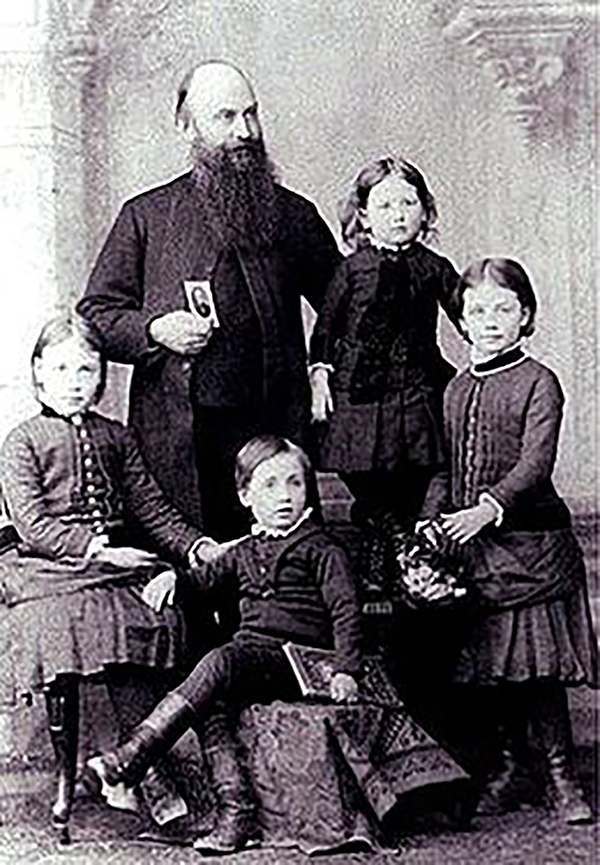
Rev. William Hechler, closest associate and faithful friend of Theodore Herzl, with Hechler’s four children.
THE ODD COUPLE
Fighting against all these elements, there couldn’t have existed more of an odd couple than these two: Theodore Herzl, the thoroughly secular Viennese journalist described by The London Daily Mail as “Tall, black bearded, handsome, a fine figure of a man, a brilliant orator, infinitely dexterous in debate, and able to address his audience in three languages…”
By his side was William Hechler, a 50-ish prophetic Bible scholar and Christian lover of Zion, working as a chaplain at the British embassy in Vienna. Herzl portrayed Hechler as “an improbable figure …I think I detect from certain signs that he is a believer in the prophets.”
At first, Herzl was not sure if he was for real or a fake. But Hechler had cultivated many friends in high places, and immediately began introducing Herzl and the vision of a Jewish state in Palestine into his large circle of royalty, and statesmen of influence.
Hechler firmly believed he had found the Jewish leader he had hoped and prayed for so many years, to lead the Jewish people back to their homeland, and he dedicated himself to Biblical Zionism and to Herzl until his hero died.
Herzl’s goal was to get the endorsement of a European ruler for his Zionist movement, believing that then the Jews, especially the rich who were now resisting him, would endorse and underwrite his vision.
Primarily with help from Hechler’s close friend and former employer, Archduke Frederic of Baden, the chaplain sought an audience for Herzl with the highest ruler on the European continent—Kaiser Wilhelm II, Emperor of the German Empire and Kingdom of Prussia.
Under the passionate tutorage of Hechler, the Duke had become a strong advocate of a Jewish state for the Jewish people. Providentially, he happened to be an uncle of the Kaiser.
The Duke agreed to write the Kaiser, asking for an appointment for Herzl. He sent along Herzl’s book, “The Jewish State,” plus Hechler’s theological essays which explained God’s promises in the Bible to return the Jews to their ancient homeland before the return of the Jewish Messiah, Jesus.
THE KAISER ANSWERS
Though the Kaiser showed interest in Herzl’s vision, he wrote back to his uncle, revealing the utterly dark anti-Semitism that inundated Europe’s Christian heritage.
“…I have looked at the writings of Pastor Hechler …The Zionist idea should be followed up, for one should not miss the opportunity to weaken Jewish power [!!] But I do not forget that the Jews killed Jesus, and that God has made them pay for this crime. If the German subjects show astonishment that the Emperor can support a Jewish movement, I suppose one could remind them of what is written in the Gospel: ‘Love your enemies and do good to those who persecute you.’ There is also this precept of Christ: ‘Make friends with unjust riches!’”
(This is the same Kaiser who became embroiled in World War I, plunging the whole of Europe into unspeakable carnage.)
This aside, the Kaiser now declared himself ready to receive Dr. Herzl! He would be leaving on October 16, 1898, for a pilgrimage to Palestine by way of Constantinople with a visit to the Sultan. He was making this historic visit to Ottoman-controlled Jerusalem and said he was amenable to asking the Sultan to grant the Jews a chartered company in Palestine under German protection.
They did meet in Constantinople, and Herzl again pleaded with the Kaiser to intercede with the Sultan, who as the absolute Ottoman ruler of Palestine, could make this dream come true. The Jews, Herzl promised with a strong dose of positive thinking, would pay for the land.
They planned to meet a second time in Jerusalem. Herzl was beyond thrilled. He wrote in his diary:
“It was then that I had the magic-forest sensation of meeting the unicorn which said with a human voice ‘I am the fabled unicorn.’”
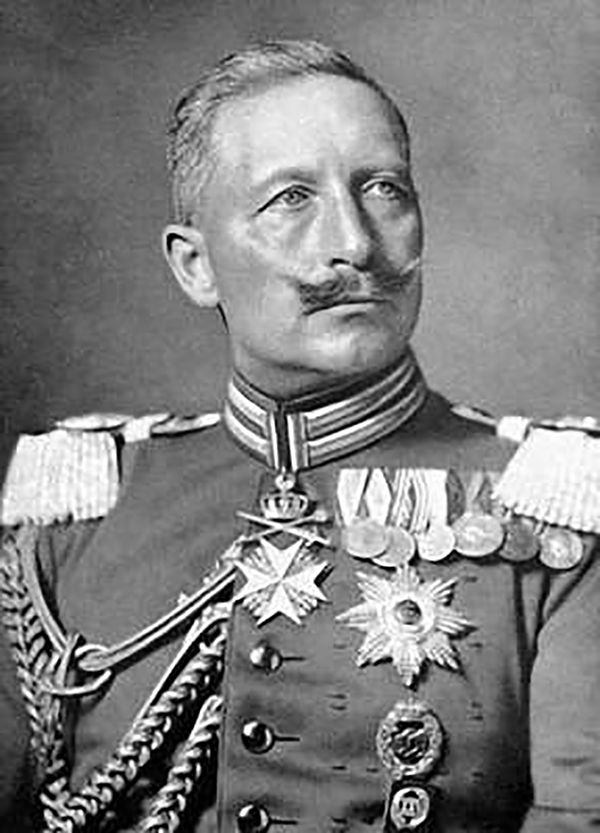
Kaiser Wilhelm II, German Emperor and King of Prussia, considered the most powerful European ruler during Herzl’s lifetime.
THE DAY THE WORLD CHANGED
What happened, no one could have predicted. Herzl decided to visit an agriculture settlement, Mikveh Israel, where the Kaiser would be passing by. Herzl recorded the scene in his diary:
October 29, 1898
“At nine o’clock a commotion on the highway, which was lined with a ‘mixed multitude’ of Arab beggars, womenfolk, children and horsemen, heralded the approach of the Imperial party. Fierce-looking Turkish cavalry galloped by at breakneck speed, hurling threatening glares and brandishing still more threatening rifles at the crowd. Then the advance couriers of the Emperor. And riding among a grey-clad group, including several ladies, the Kaiser himself.
The Kaiser recognized me at a distance. It gave him something of a start, he reined in his horse where I stood, and pulled up across from me. I moved forward a pace or two and when he leaned down past the neck of his horse and held out his hand to me, I stepped close to the mount and stretched up my own hand.
He laughed and darted one of his imperious glances at me:
‘How are you?’
‘Thanks, Your Majesty; I am having a look at the country. And how has Your Majesty found the journey?’
‘Very hot! But the country has a future.’
‘It is still sick,’ I said.
‘Water is what it needs,’ he said, bending down, ‘much water.’
‘Yes, Your Majesty, irrigation on a large scale.’
He repeated: ‘It is a land with a future.’
Then he held down his hand to me again, and cantered off. The Empress, too, had ridden forward and gave me a smiling nod. Among the retinue I recognized the Court-Marshall Eulenburg, [a pro-Zionist “convert” of Hechler] who greeted me affably. Then the Imperial procession once more got under way…
The spectators at Mikveh Israel were altogether dumbfounded. Some of them asked who it had been. The Rothschild administrators looked sullen and annoyed [because although Rothschild had poured millions of pound sterling into creating agriculture settlements, he opposed the Zionist movement to establish a Jewish state].”
WHAT HERZL DIDN’T KNOW
The entire roadside meeting had lasted perhaps two or three minutes.
But Herzl was unaware of what actually happened. Neither he nor Hechler knew that when the Kaiser had discussed with the Sultan the idea of a German protectorate to establish a Jewish homeland—a Jewish homeland to be purchased with Jewish money—the Sultan had completely rejected it.
So when they met outside of Mikveh Israel, the Kaiser had already abandoned any plans to support Herzl’s enterprise.
When Herzl met with the Kaiser again in Jerusalem, it became clear to the Jewish leader that he had failed. The Kaiser was very vague, his entourage very cold. Herzl and his Zionist delegation did not get German or Ottoman support for the establishment of the Jewish state. They would have to find another way.
To be fair, the Kaiser had approached the Sultan about the Zionist project several times. But the Sultan, Caliph of the Muslims, refused to surrender a single meter of Muslim land to non-believers, and certainly, not to Jews. It was over.
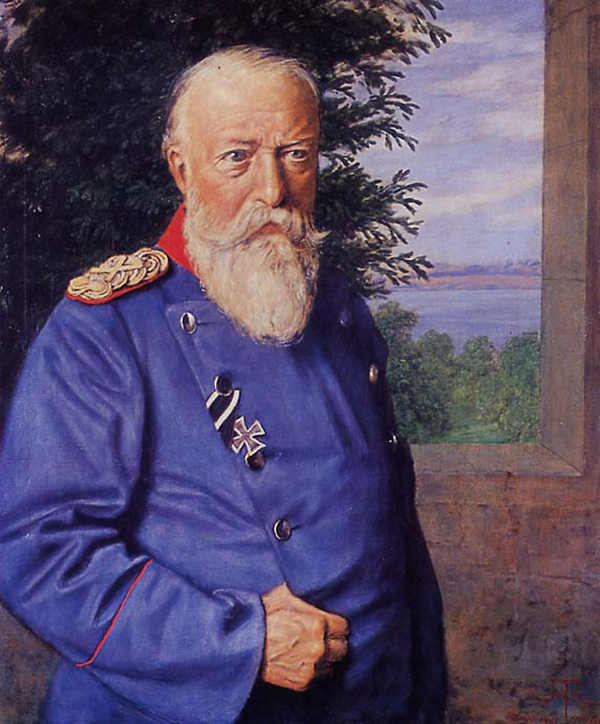
Frederick I, Grand Duke of Baden, uncle of the Kaiser, who hired William Hechler as tutor for his children, and through Hechler’s teaching became a strong proponent of the Biblical promise to return the Jewish people to their homeland.
A MIRACLE HAPPENS
Herzl had failed with the Germans but he had succeeded on the world stage of public opinion! It was tantalizingly recorded by the media with amazement. In three or four minutes, it happened!
Up until this Kaiser/Sultan fiasco, the Zionists were considered a pipedream. No major European power would recognize the “crazy Jewish Zionists.”
But the world press saw those couple of minutes very differently. Their eyes registered a meeting between the greatest ruler in the world and the unchallenged leader of Jewish Zionism. In the twinkling of an eye, Herzl’s vision became legitimate.
The headlines in The London Daily Mail Friday on November 18, 1898 clearly proclaimed the new reality.
“IMPORTANT RESULT OF THE KAISER’S TOUR/SULTAN AND EMPEROR AGREED IN PALESTINE/BENEVOLENT SANCTION GIVEN TO THE ZIONIST MOVEMENT”
The article continued:
“One of the most important results, if not the most important, of the Kaiser’s visit to Palestine is the immense impetus it has given to Zionism, the movement for the return of the Jews to Palestine. The gain to this cause is the greater since it is immediate, but perhaps more important still is the wide political influence which this Imperial action is likely to have.
“It has not been generally reported that when the Kaiser visited Constantinople, Dr. Herzl, the head of the Zionist movement, was there; again when the Kaiser entered Jerusalem he found Dr. Herzl there. These were no mere coincidences, but the visible signs of accomplished facts.
“At the end of last month the Sultan gave his first official [audience] to a Zionist deputation headed by Dr. Herzl who is no stranger to Abdul Hamid. Almost at the same time the Kaiser, who was in Constantinople, also received Dr. Herzl, and promised to receive a Jewish deputation in Palestine…”
The Daily Mail continued:
“It is hardly necessary to urge the importance of these proceedings. The actions of the Sultan and the Kaiser are not dictated by sentiment but by statesmanship…
“The Jewish Question had long engaged the earnest attention of Europe’s statesmen. Year by year, it has become more acute. If Dr. Herzl’s forthcoming efforts are as successful as the former ones the long-sought solution is found.”
The New York Times wrote similarly long and highly favorable articles about the great significance these meetings with the Kaiser and Sultan were to the Zionist vision of creating a state for the Jews.
But the Sultan and the Kaiser had not at all agreed to sanction the Zionist movement or Herzl. It did not matter. The world press got it wrong and that is what mattered. The world press saw the events at Mikveh Israel as extraordinarily successful for Zionism, Herzl and the Jewish people. And that was how they reported it worldwide.
The effect was electric around the world. Herzl, the Jew, Herzl, the Zionist, was recognized by the Kaiser, so they reported. Simply and miraculously: Herzl and Zionism were legitimized.
It was historic. It was the first public recognition of Theodor Herzl, a Jew, by the head of a major world power. It was Herzl’s public legitimization as a major player on the stage of world politics.
Herzl never lived to see his dream fulfilled. Tired, ill and weakening, he became absolutely frantic for an immediate solution as he watched the indescribable suffering of Russian and Eastern European Jews under the terrible Czar.
Even the English became interested in the Russian pogroms, and the British Colonial Secretary made an alternate suggestion to Herzl—that the Jews find a safe haven in Uganda! He offered Herzl 5,000 square miles of what today is Kenya.
Desperate for a solution, any solution for the Jewish problem, Herzl brought the subject of Uganda forward for a vote in the sixth Zionist Congress in 1903 and the motion to explore the possibility was passed! However, the Russian representatives in the Congress began weeping and walked out of the hall.
The issue of Uganda was the only matter on which Hechler strongly disagreed with Herzl. He knew with every fiber of his being that God had promised the Jewish people a return to their own ancient homeland. Herzl died before there was any resolution. However, just the idea bubbling to the surface of a homeland for the Jews helped focus British politicians to the need for a Jewish homeland, ultimately resulting in the Balfour Declaration.
From the first days of their acquaintance, to the Zionist Congresses, to Herzl’s death, Hechler was at Herzl’s side. Hechler suffered the setbacks with Herzl but never abandoned his faith that God would return His people to the Promised Land.
As Herzl lay dying, he feared all of his last years had been in vain, that he had been an unprofitable servant.
He had bankrupted his family, ruined his marriage, ruined his relationships with his children, and destroyed his health for Zionism and the Jewish people.
He died of a broken heart. He was 44 years old.
Yet, exactly 50 years after Herzl made his prophetic statement that in 50 years, there would be a Jewish state, that statement was fulfilled.
The new state of Israel had barely emerged as victor of the battle waged against her by five armies intent on destroying her, when the Israeli Knesset decided to fulfill the last wish of Theodore Herzl.
An Israeli plane brought Herzl home on August 16, 1949, and the pilots flew his bones over the whole State of Israel before laying him to rest in the Mt. Herzl military cemetery in Jerusalem.
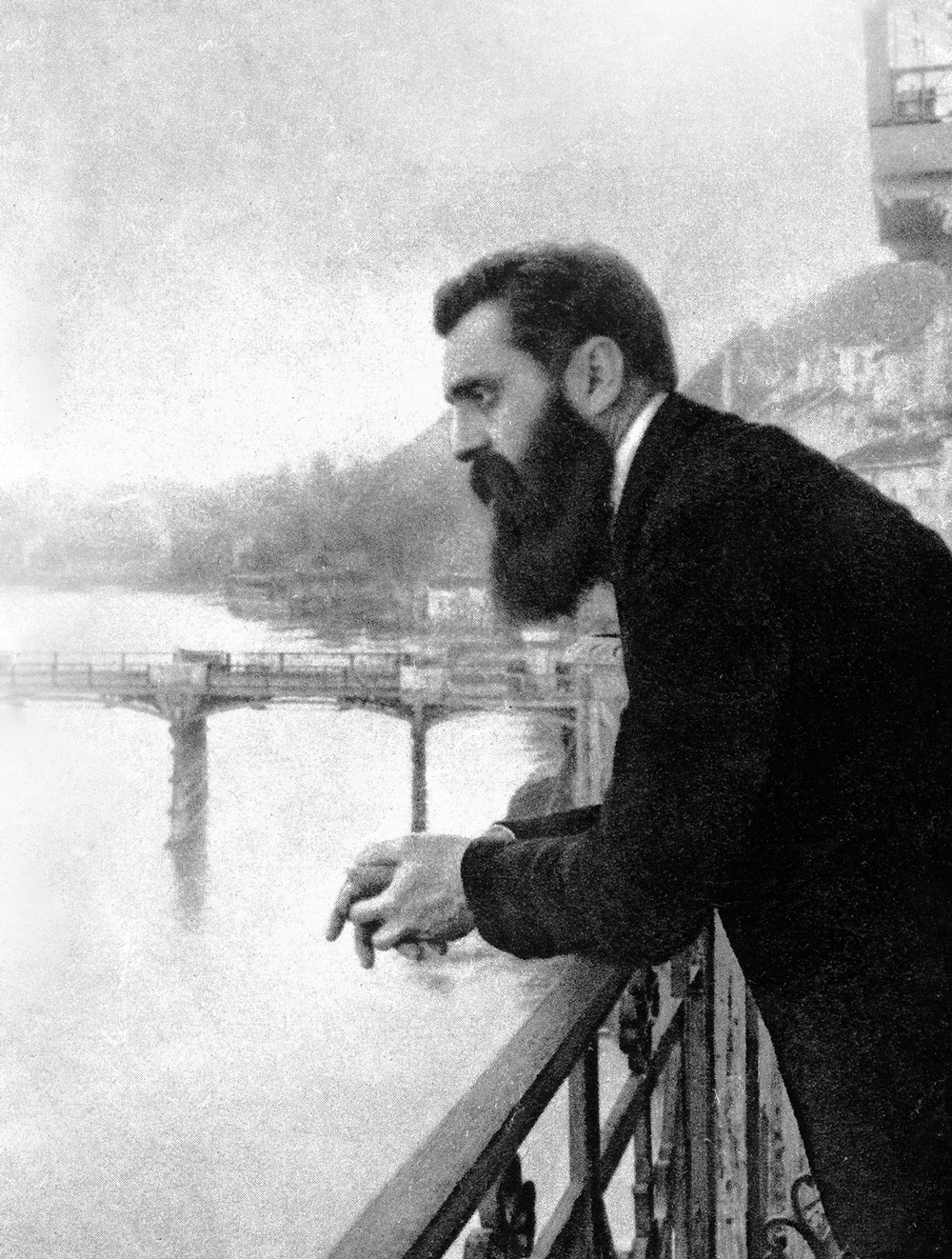
Theodore Herzl, father of modern Israel, looking over the balcony of his hotel in Basel, Switzerland, possibly during the Sixth Zionist Conference (and his last) in 1903. He died a year later.
HECHLER FADES INTO OBSCURITY
Hechler’s 25-year position as the Anglican chaplain at the British Embassy in Vienna ended not long after Herzl’s death. He traveled back to Palestine and continued in his efforts to promote Zionism in the Christian world. But the Jewish world had little to do with him anymore.
We can only imagine the unspeakable joy he experienced when he heard with his own ears that Britain viewed with favor the establishment in Palestine of a national home for the Jewish people in 1917.
The British Zionist community in the 1920’s did agree to give Hechler, the old man, a small pension of ten pounds a month. On the silver anniversary of Herzl’s death, a memorial book of remembrances was created. Hechler wrote a small article for it in 1929.
WHERE WAS HECHLER BURIED?
Two years later, Hechler died at Mildmay Hospital in North London. When friends went to gather up his papers and charts he had spent a lifetime producing, his German landlord said they had burned everything up. He was buried in an unmarked grave.
In fact, nobody seemed to know what cemetery he was buried in when Jerry Klinger, a Jewish history buff, writer and founder of the Jewish American Society for Historic Preservation, heard of his existence through reading Herzl’s diaries.
He began wondering about this person of whom Herzl wrote so much. Where was he buried? Klinger said, “My goal was simple. I wanted to stand by Hechler’s gravesite and say thank you.” Through the scholar Rev. David Pileggi, at Christ Church in Jerusalem, Klinger began searching cemeteries in London.
THE GRAVE IS FOUND
Klinger found the cemetery and looked at the undistinguished patch of earth. “Before me,” he wrote, “was the resting place of a man, without whom Zionism and Israel might never have come into being. Before me was the resting place of a man that was owed something much better.”
Jerry Klinger arranged a stone dedication on the 80th anniversary of Hechler’s death, January 30, 2011. Because that date was also Holocaust Memorial Day, Christians asked that the dedication be a day later.
Ironically, Hechler, before he died, had warned the Jewish world of a major catastrophe that was coming if they didn’t complete Herzl’s vision and return to Palestine. But Hechler, while alive, was snubbed as a crazy old man by most Jews.
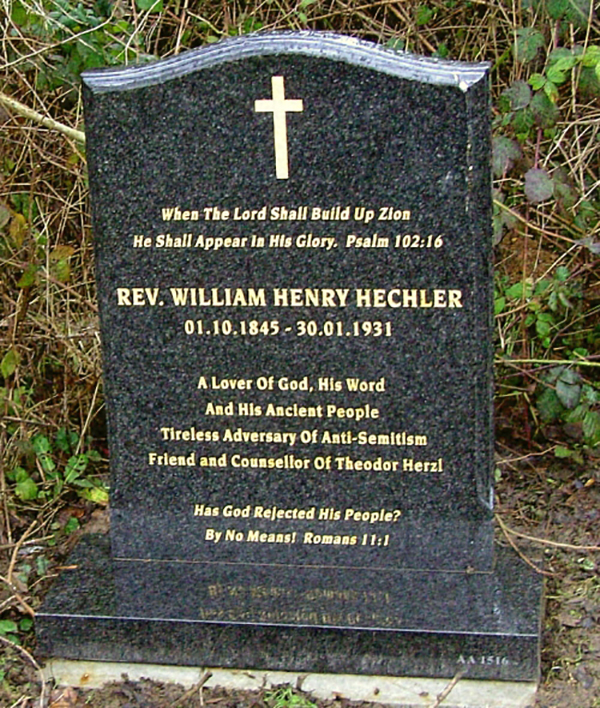
The Tombstone erected over Rev. William Hechler’s unmarked grave, presented by Jerry Klinger, founder of the Jewish American Society for Historic Preservation, on the 80th anniversary of the pastor’s death.
On January 31, 2011, TV film crews and newspaper correspondents recorded the event as both Christians and Jews, including Israeli officials, gathered at Hechler’s gravesite to dedicate the modest but proper tombstone selected for Reverend Hechler. The text carved into the dark grey stone was chosen by Jerry Klinger:
“When The Lord Shall Build Up Zion, He Shall Appear in His Glory, Psalm102:16
Reverend William Henry Hechler
1.10.1845 – 30.01.1931
A Lover of God, His Word
and His Ancient People
Tireless Adversary of Anti-Semitism
Friend and Counselor of Theodor Herzl
Has God Rejected His People?
By No Means! Romans 11:1
AN AFTERTHOUGHT
There is a bigger story here than even what this article presents.
Satan has read the Bible and knows God has promised that the Jews in the last days would return to their homeland and to their God. Therefore Satan has worked for centuries to make sure that doesn’t happen. As every Israeli knows, somehow and for some reason there is a Haman in every generation.
He planted Jew-hatred (anti-Semitism) deeply within the European religion. He made sure the whole of the Holy Land remained securely in the hands of Muslim rulers for centuries, full of Islamic hatred against the Jews. And he worked his plans toward the total destruction of Jews through pogroms, inquisitions and ultimately the Holocaust.
But God raised up two men. One, an intelligent, educated Jew, a natural leader with a heart that suffered greatly for his own people. The second, a prophetic Bible scholar, with a deep faith and longing to see his Messiah return and an overwhelming love for the Jewish people. It had been revealed to him through Scripture that God’s plan was not only to offer salvation to the world, but to keep His ancient promise to Abraham by bringing His beloved descendants back to the Land of Israel and to the God of Israel.
These two men were actually fighting the whole world. They readily offered their lives a living sacrifice to this cause. Their stubbornness, their passion knew no end. Prayers from the second man went up three times a day to heaven. But what could two men do?
By the strangest coincidence, a chance meeting of the Jewish leader with Europe’s royal leader was turned into a massive media success that touched the political world and established a future State of Israel. The god of this world’s centuries-long preparation to destroy the Jewish people failed again. God uses whom He will.
PRINCIPLE SOURCES:
Much of the research for this article was garnered from The Prince and The Prophet by Claude Duvernoy, www.israelinprophecy.org; and from Rev. William Hechler and Theodor Herzl, A Zionist Debt Fulfilled, by Jerry Klinger.
For more information:
www.jewishmag.co.il
www.jewishvirtuallibrary.org
www.jewish-american-society-for-historic-preservation.org
www.jewish-american-society-for-historic-preservation.org
The Prince and the Prophet by Claude Duvernoy